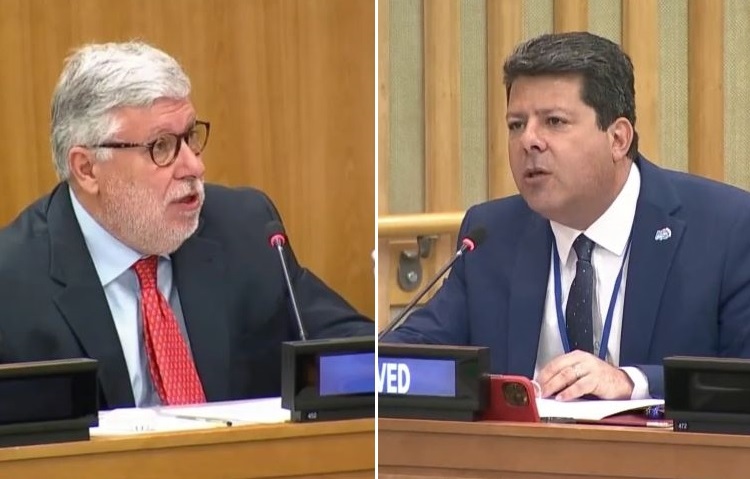The Diplomat
The Governments of Spain and Gibraltar have once again staged their great differences before the UN Decolonization Committee, in which the Spanish representative reiterated that “there is no other solution to the dispute” than a decolonization negotiated bilaterally between Spain and the United Kingdom under the terms of the UN and the Chief Minister Fabian Picardo warned that the Gibraltarians “will never” accept being “mere bystanders in the decolonization”.
“Unfortunately, despite the efforts of the United Nations and its repeated recommendations and resolutions, an anachronistic colonial situation that my country continues to suffer in the 21st century and which results in the maintenance of the only existing colony on the European continent, has not been resolved,” said the ambassador permanent representative of Spain to the United Nations, Agustín Santos Maraver.
“This Organization has recognized on numerous occasions the specificity of the decolonization process of Gibraltar, noting that the colonial situation of Gibraltar undermines the territorial integrity of Spain,” he continued during his speech, which took place this past Monday. “Consequently, my country maintains that the definitive solution involves the restitution of the territory, both the territory ceded under the Treaty of Utrecht, as well as that which was subsequently occupied illegally and without any title by the United Kingdom,” he added.
Santos also recalled that, since 1965, “the United Nations General Assembly has been pronouncing every year on the Gibraltar dispute, asking Spain and the United Kingdom to reach an agreement on its decolonization”. Besides, “the United Kingdom registered Gibraltar in 1946 as a ‘non-self-governing territory'” and, since 1963, “Gibraltar was included in the list of territories subject to decolonization, within the scope of action of this Committee,” he continued. All this “proves beyond appeal that the relationship between Gibraltar and the United Kingdom is of a colonial nature,” he said.
“The General Assembly, in short, has been urging for more than 50 years the administering power and Spain to resolve all their differences on this issue through a bilaterally negotiated solution between Spain and the United Kingdom” and, therefore, “what Spain is asking for is full compliance with what the United Nations has ordered: to enter into negotiations with the United Kingdom to put an end to this colonial situation, in which the interests of the population of the Territory will be taken into account,” said the ambassador.
“Today we reiterate, once again, our call to the United Kingdom to do so”, since “there is no other solution to the Gibraltar dispute than a decolonization process negotiated between Spain and the United Kingdom under the terms established by the United Nations”, he warned. In this sense, he warned, “the decolonization process must be governed by the United Nations” and, therefore, “the process will not conclude until the General Assembly of the United Nations so decides”, because “it is not given to the administering power to declare by itself that the decolonization of a particular territory is finished”.
Picardo
For his part, Fabian Picardo assured that Gibraltar has “repeatedly” asked the Committee to remove the Rock from its list of Non-Self-Governing Territories and will continue to “fight” to achieve it because “there can be no valid argument in international law” for its permanence on that list.
“In expressing to you the passion that we feel for the defence of our homeland, and our insistence in asserting our right to self-determination, we are not seeking to exclude cooperation with our neighbours, despite our differences on key, fundamental issues,” the chief minister assured. “We are a mature people, confident in our own identity, aware of our rights, conscious of the challenges on our horizon and aware of the need to work with those around us in a spirit of maturity and diplomatic and economic cooperation” and, therefore, he said, “we will work in amity and cooperation with our neighbors, to the north and south,” to “facilitate the lives and trade of those who need or wish to cross our borders as fluidly and safely as possible.”
“That is why we are working closely with the United Kingdom, with the European Union and with the Kingdom of Spain on a Treaty which will safely and securely set out the parameters for our future relationship with the EU” and, at the same time, “we are also ready to address issues which have marred the relationship between Gibraltar and Spain in Memoranda of Understanding which can exist in parallel to such a UK/EU Treaty,” he continued. “It has to be said, that we have seen some of the same from our Spanish counterparts. There are reasons to be optimistic about solutions coming down the track,” he added.
However, he warned, “what we will never accept, however, is the notion that we, the Gibraltarians, are mere bystanders in the decolonisation of Gibraltar,” because “we are a genuine ‘people’ in our own right with the inalienable right of self determination.” “That is why we will never accept that the United Nations should determine, year after year, that the international legal status of our land should be the subject, not of our decision, but of dialogue between the administering power and a third party,” he said.







